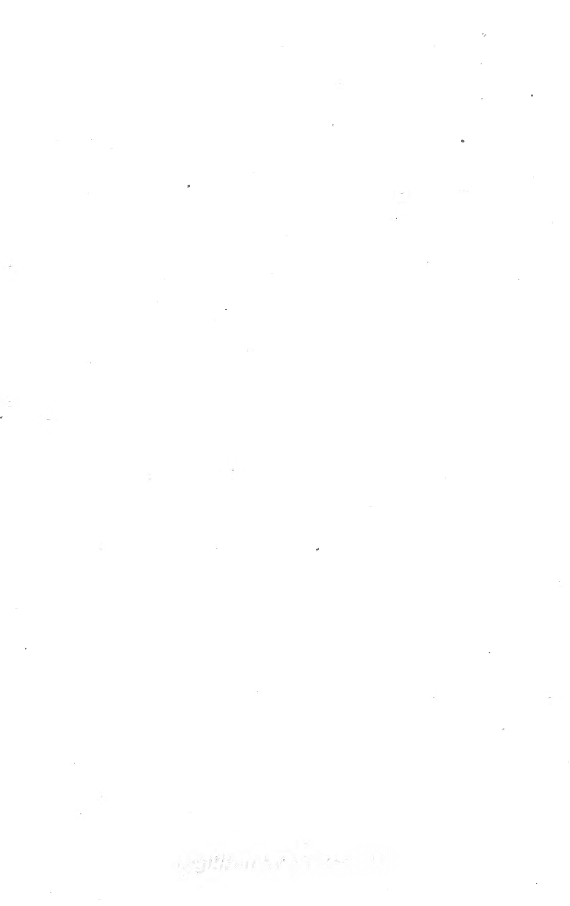Bourke Ulick J. Aryan Origin of the Gaelic Race and Language
Подождите немного. Документ загружается.

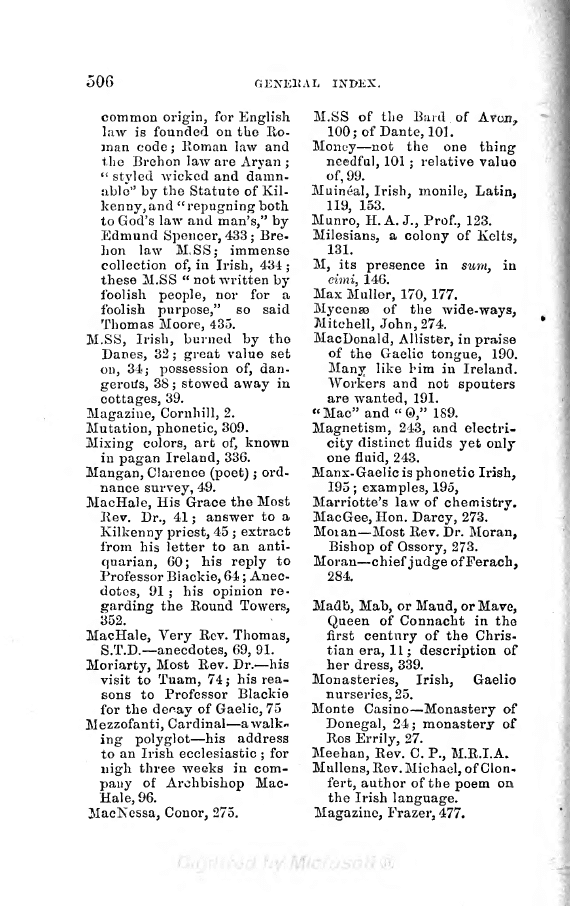
506
r;
J:XI;KAL INDEX.
common
origin,
for
English
law
is
founded
on
the He-
man code
;
Roman
law
and
the Brehon
law are
Aryan
;
"
styled
wicked
and damn-
able"
by
the
Statute
of
Kil-
kenny,
and
"
repugning
both
to God's
law and
man's,"
by
Edmund
Spencer,
433
;
Bre-
hon law
M.SS;
immense
collection
of,
iu
Irish,
434
;
these
M.SS
"
not
written
by
foolish
people,
nor for a
foolish
purpose,"
so said
Thomas
Moore,
435.
M.SS,
Irish,
burned
by
the
Danes,
32
;
great
value set
on,
34;
possession
of,
dan-
gerous,
38
;
stowed
away
in
cottages,
39.
Magazine,
Cornhill,
2.
Mutation,
phonetic,
309.
Mixing
colors,
art
of,
known
in
pagan
Ireland,
336.
Mangan,
Clarence
(poet)
;
ord-
nance
survey,
49.
MacHale,
His
Grace
the
Most
Rev.
Dr.,
41
;
answer
to a
Kilkenny
priest,
45
;
extract
from
his
letter
to
an anti-
quarian, 60;
his
reply
to
Professor
Biackie,
64
;
Anec-
dotes,
91
;
his
opinion
re-
garding
the Round
Towers,
352.
MacHale,
Very
Rev.
Thomas,
S.T.D.
anecdotes,
69,
91.
Moriarty,
Most Rev.
Dr. his
visit to
Tuam, 74;
his rea-
sons to
Professor
Biackie
for
the
deray
of
Gaelic,
75
Mezzofanti,
Cardinal
awalk
ing
polyglot
his address
to
an Irish ecclesiastic
;
for
iiigh
three
weeks in com-
pany
of
Archbishop
Mac-
Hale,
96.
MacKessa, Conor,
275.
M.SS of the Bard
of
Avon,
100;
of
Dante,
101.
Money
not
the one
thing
needful,
101
;
relative value
of,
99.
Muineal,
Irish,
monile, Latin,
119,
153.
Munro,
H.A.
J., Prof.,
123.
Milesians,
a
colony
of
Kelts,
131.
M,
its
presence
in
sum,
in
cimi,
146.
Max
Muller, 170,
177.
Mycenae
of the
wide-ways,
Mitchell,
John,
274.
MacDonakl,
Allister,
in
praise
of
the Gaelic
tongue,
190.
Many
like him in
Ireland.
Workers and
not
spouters
are
wanted,
191.
"
Mac"
and
"
0,"
189.
Magnetism,
243,
and
electri-
city
distinct
fluids
yet
only
one
fluid,
243.
Manx- Gaelic is
phonetic Irish,
195
; examples,
195,
Marriotte's
law of
chemistry.
MacGee,
Hon.
Darcy,
273.
Moian
Most Rev. Dr.
Moran,
Bishop
of
Ossory,
273.
Moran
chief
judge
of
Ferach,
284.
Madb, Mab,
or
Maud,
or
Mave,
Queen
of Connacht in
the
first
century
of the Chris-
tian
era,
11
;
description
of
her
dress,
339.
Monasteries,
Irish,
Gaelic
nurseries,
25.
Monte
Casino
Monastery
of
Donegal,
24;
monastery
of
Ros
Errily,
27.
Meehan,
Rev. C.
P.,
M.E.I.A.
Mullens,
Rev.
Michael,
of Clon-
fert,
author of
the
poem
on
the Irish
language.
Magazine, Frazer,
477.
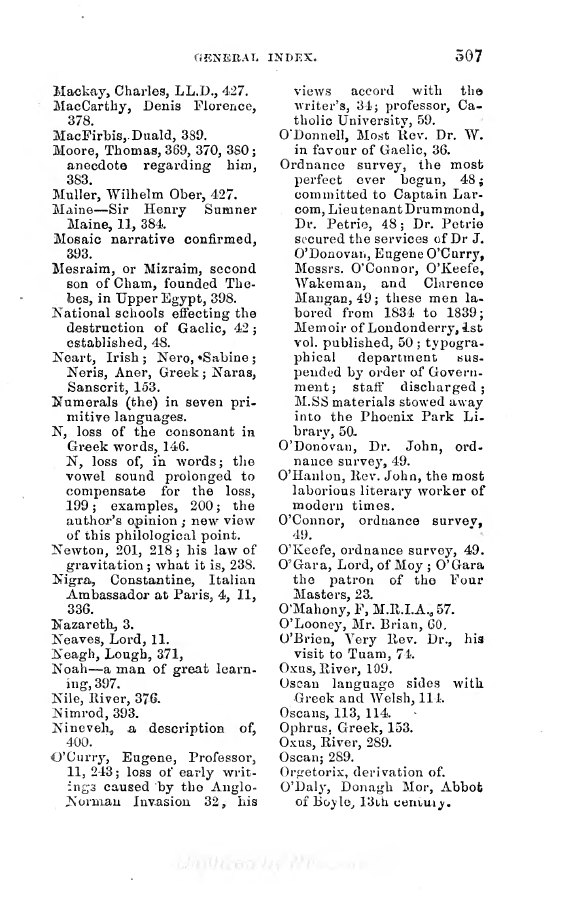
507
Mackay,
Charles,
LL.D.,
427.
MacCarthy,
Denis
Florence,
378.
MacFirbis,.Duald,
389.
Moore,
Thomas,
369,
370,
380
;
anecdote
regarding
him,
383.
Muller,
Wilhelm
Ober,
427.
Maine Sir
Henry
Summer
Maine,
11,
384.
Mosaic
narrative
confirmed,
393.
Mesraim,
or
Mizraim,
second
son
of
Cham,
founded
The-
bes,
in
Upper
Egypt,
398.
National
schools
effecting
the
destruction
of
Gaelic,
42
;
established,
48.
Noart,
Irish
;
Nero,
Sabine
Neris,
Aner,
Greek
;
Naras,
Sanscrit,
153.
Numerals
(the)
in
seven
pri-
mitive
languages.
N,
loss of
the
consonant
in
Greek
words,
146.
N,
loss
of,
in
words;
the
vowel
sound
prolonged
to
compensate
for
the
loss,
199;
examples,
200;
the
author's
opinion
;
new view
of
this
philological
point.
Newton, 201,
218
;
his law
of
gravitation ;
what it
is,
238.
Nigra, Constazitine,
Italian
Ambassador at
Paris,
4,
II,
336.
Nazareth,
3.
Neaves,
Lord,
11.
Neagh,
Lough,
371,
Noah a man of
great
learn-
ing,
397.
Nile, River,
376-
Nimrod,
393.
Nineveh,
&
description
of,
400.
O'
Curry,
Eugene,
Professor,
11, 243;
loss
of
early
writ-
ings
caused
by
the
Anglo-
Norniau
Invasion
32,
his
views accord
with
the
writer's,
34;
professor,
Ca-
tholic
Universitv,
59.
O'Donnell,
Most
Kev. Dr. W.
in
favour
of
Gaelic,
36.
Ordnance
survey,
the
most
perfect
over
begun,
48
;
committed to
Captain
Lar-
com,
LieutenantDrummond,
Dr.
Petrie, 48;
Dr. Petrie
secured
the services
of Dr J.
O'Donovan,
Eugene
O'Curry,
Messrs.
O'Connor,
O'Keefe,
Wakeman,
and Clarence
Mangan,
49;
these men la-
bored
from
1834
to
1839;
Memoir
of
Londonderry,
1st
vol.
published,
50
;
typogra-
phical
department
sus-
pended
by
order of Govern-
ment;
staff
discharged;
M.SS materials stowed
away
into the
Phoenix
Park
Li-
brary,
50.
O'Donovan,
Dr.
John,
ord-
nance
survey,
49.
O'Hanlon,
Rev.
John,
the most
laborious
literary
worker
of
modern
times.
O'Connor,
ordnance
survev,
49.
O'Keefe,
ordnance
survey,
49.
O'Gara, Lord,
of
Moy
;
O'Gara
the
patron
of the
Four
Masters,
23.
O'Mahony,
F,
M.H.I.A.,
57.
O'Looney,
Mr.
Brian,
GO.
O'Brien,
Very
Rev.
Dr.,
hia
visit
to
Tuam,
74.
Oxus,
River,
109.
Oscau
language
sides
with
Greek
and
Welsh,
111.
Oscans, 113,
114.
Ophrus.
Greek,
153.
Oxus, River,
289.
Oscan;
289.
Orgetorix,
derivation of.
O'Daly, Donagh
Mor,
Abbot
of
Boyle,
13ih
cerauiy.
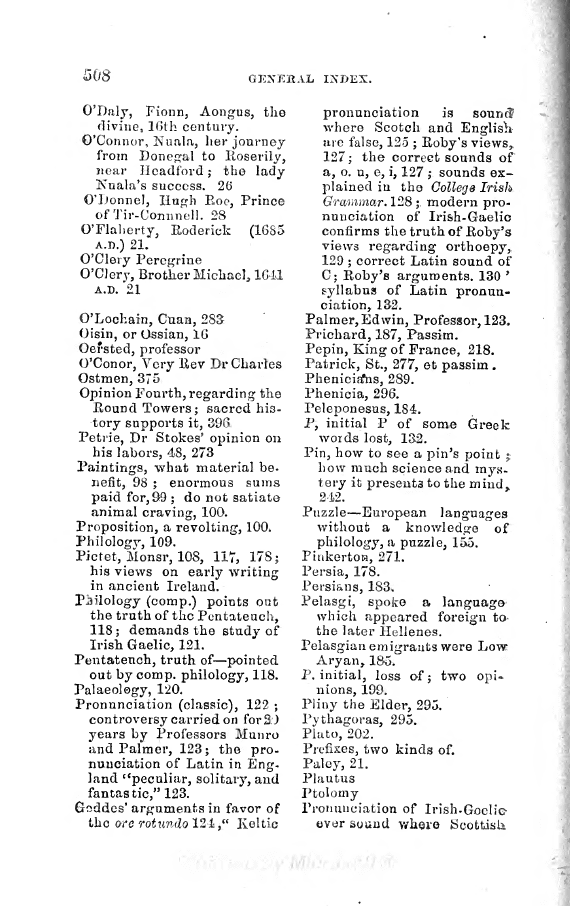
508
GENERAL
INDEX.
O'Daly,
Fionn,
Aongus,
the
divine,
16th
century.
O'Connor,
Nuala,
her
journey
from
Donegal
to
Eoserily,
near
lleadford
;
the
lady
Kuala's
success. 26
O'JJonnel,
Hugh Eoe,
Prince
of
Tir-Connneli. 28
O'Flaherty,
Eoderick
(1685
A.D.)
21.
O'Clery Peregrine
O'Clery,
Brother
Michael,
1641
A.D.
21
O'Lochain,
Cuan,
283
Oisin,
or
Ussian,
16
Oersted,
professor
O'Conor,
Very
llev Dr Charles
Ostmen,
3~5
Opinion
Fourth,
regarding
the
Bound
Towers;
sacred
his-
tory
supports
it,
396
Petrie,
Dr Stokes'
opinion
on
his
labors,
48,
273
Paintings,
what material
be-
nefit,
98
;
enormous
sums
paid
for,
95
;
do
not
satiate
animal
craving,
100.
Proposition,
a
revolting,
100,
Philology,
109.
Pictet,
Monsr,
108, 117,
178;
his
views on
early
writing
in
ancient
Ireland.
Philology
(comp.)
points
out
the
truth of
the
Pentateuch,
118
;
demands
the
study
of
Irish
Gaelic,
121.
Pentateuch,
truth of
pointed
out
by
comp.
philology,
118.
Palaeolegy,
120.
Pronunciation
(classic),
122
;
controversy
carried
on for
2
)
years
by
Professors
Muuro
and
Palmer,
123;
the
pro-
nuuciation
of
Latin
in
Eng-
land
"peculiar,
solitary,
and
fantastic,"
123.
Goddes'
arguments
in
favor
of
the
ore
rotundo
124
,"
Kelliu
pronunciation
is
sound
where Scotch
and
English
are
false,
125
;
Eoby's
views,
127;
the
correct sounds
of
a,
o.
u,
e,
i,
127
;
sounds
ex-
plained
in
the
College
Irish
Grammar.
128
;.
modern
pro-
nunciation
of
Irish-Gaelic
confirms the
truth of
Eoby's
views
regarding
oi'thoepy,
129
;
correct
Latin
sound of
C;
Eoby's arguments.
130
'
syllabus
of
Latin
pronun-
ciation,
132.
Palmer,
Edwin,
Professor,
123.
Prichard, 187,
Passim.
Pepin,
King
of
France,
218.
Patrick,
St., 277,
et
passim
.
Phenicia^is,
289.
Phenicia,
296.
Peleponesus,
184.
P,
initial
P
of
some
Greek
words
lost,
132.
Pin,
how
to
see a
pin's
point
;
how much
science
and
mys-
tery
it
preseuta
to
the
mind.
242.
Puzzle
European
languages
without
a
knowledge
of
philology,
a
puzzle,
155.
Pinkertom,
271.
Persia,
178.
Persians,
183,
Pelasgi,
spoke
a
language
which
appeared
foreign
to-
the
later
Hellenes.
Pelasgian
emigrants
were
Low-
Aryan,
185.
P.
initial,
loss of
;
two
opi-
nions,
199.
Pliny
the
Elder,
295.
Pythagoras,
295.
Plato,
202.
Prefixes,
two
kinds
of.
Paley,
21.
Piautus
Ptolomy
Pronunciation
of
Irish.
Gcelie-
ever
sound
where
Scottish.
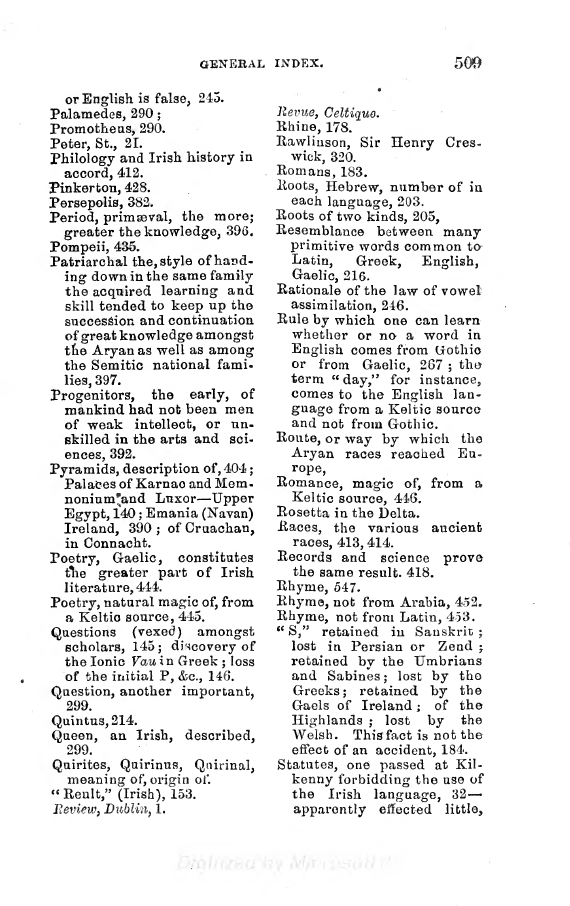
GENEBAL
INDEX.
509
or
English
is
false,
243.
Palamedes,
290
;
Prometheus,
290.
Peter, St.,
21.
Philology
and
Irish
history
in.
accord,
412.
Pinkerfcon,
428.
Persepolis,
382.
Period,
primaeval,
the
more;
greater
the
knowledge,
396.
Pompeii,
435.
Patriarchal
the,
style
of hand-
ing
down in
the
same
family
the
acquired
learning
and
skill
tended
to
keep up
the
succession
and
continuation
of
great
knowledge amongst
the
Aryan
as
well
as
among
the
Semitic
national
fami-
lies,
397.
Progenitors,
the
early,
of
mankind
had not
been men
of
weak
intellect,
or tin-
skilled
in
the
arts
and
sci-
ences,
392.
Pyramids,
description
of,
404
;
Palaces
of
Karnac and
Mem-
nonium'and
Luxor
Upper
Egypt,
140
;
Emania
(Navan)
Ireland,
390
;
of
Cruachan,
in Connacht.
Poetry,
Gaelic,
constitutes
tlac
greater part
of
Irish
literature,
444.
Poetry,
natural
magic
of,
from
a
Keltic
source,
445.
Questions
(vexed)
amongst
scholars,
145
;
discovery
of
the Ionic Va
u
in
Greek
;
loss
of the
initial
P, &c.,
146.
Question,
another
important,
299.
Quintus,214.
Queen,
an
Irish, described,
299.
Quirites,
Quirinus,
Quirinal,
meaning
of,
origin
of.
"Keult,"
(Irish),
153.
Review,
Dublin,
I.
Revue,
Celtique.
Rhine,
178.
Rawlinson,
Sir
Henry
Cres-
wick,
320.
Romans,
183.
Hoots,
Hebrew,
number of in
each
language,
203.
Roots
of
two
kinds,
205,
Resemblance between
many
primitive
words common to
Latin,
Greek,
English,
Gaelic,
216.
Rationale
of the
law
of
vowel
assimilation,
246.
Rule
by
which one can
learn
whether
or
no a word
in
English
comes from Gothic
or
from
Gaelic,
267
;
tho
term
"day,"
for
instance,
comes to
the
English
lan-
guage
from a
Keltic
source
and
not from
Gothic.
Route,
or
way
by
which
the
Aryan
races
reached
Eu-
rope,
Romance,
magic
of,
from
a
Keltic
source,
446.
Rosetta
in the
Delta.
Races,
the
various
ancient
races, 413,
414.
Records
and
science
prove-
the
same
result. 418.
Rhyme,
547.
Rhyme,
not
from
Arabia,
452.
Rhyme,
not
from
Latin,
453.
"
S,"
retained
in Sanskrit
;
lost
in
Persian
or
Zend
j
retained
by
the
Umbrians
and
Sabines
;
lost
by
the
Greeks,-
retained
by
the
Gaels
of
Ireland;
of the
Highlands
;
lost
by
the
Welsh.
This fact
is
not
the
effect
of
an
accident,
184.
Statutes,
one
passed
at
Kil-
kenny
forbidding
the
use
of
the
Irish
language,
32
apparently
effected
little,
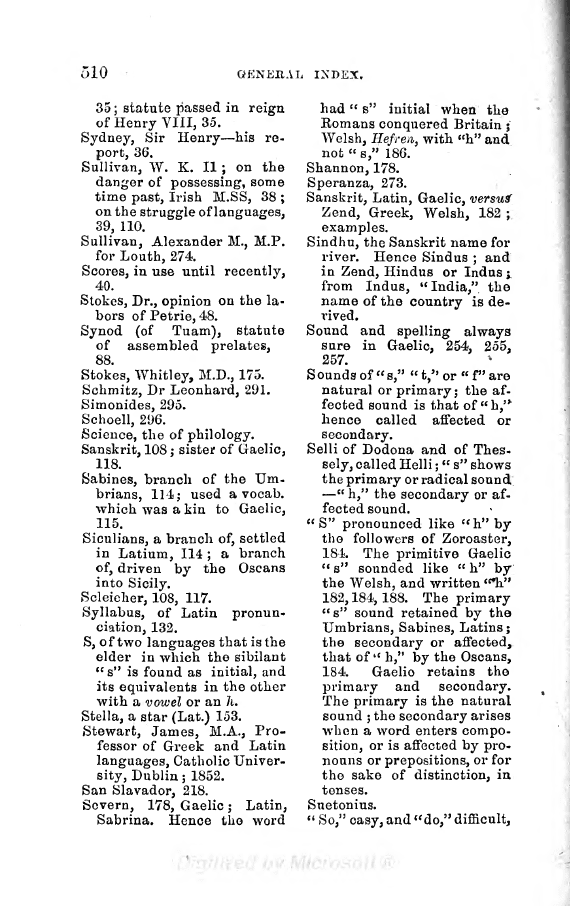
510 GENERAL
INDEX.
35
;
statute
passed
in
reign
of
Henry
VIII,
35.
Sydney,
Sir
Henry
his re-
port,
36.
Sullivan,
W. K.
II;
on
the
danger
of
possessing,
some
time
past,
Irish
M.SS,
38
;
on
the
struggle
of
languages,
39,
110.
Sullivan,
Alexander
M.,
M.P.
for
Louth,
274.
Scores,
in
use until
recently,
40.
Stokes, Dr.,
opinion
on the
la-
bors of
Petrie,48.
Synod
(of
Tuam),
statute
of
assembled
prelates,
88.
Stokes,
Whitley,
M.D.,
175.
Schmitz,
Dr
Leonhard,
291.
Simonides,
295.
Schoell,
206.
Science,
the
of
philology.
Sanskrit,
108
;
sister
of
Gaelic,
118.
Sabines,
branch
of
the Um-
brians,
114;
used
a vocab.
which
was
a
kin
to
Gaelic,
115.
Siculians,
a
branch
of,
settled
in
Latium,
114
;
a
branch
of,
driven
by
the
Oscans
into
Sicily.
Scleicher, 108,
117.
Syllabus,
of
Latin
pronun-
ciation,
132.
S,
of
two
languages
that
is
the
elder
in
which
the sibilant
"
s"
is
found as
initial,
and
its
equivalents
in
the
other
with
a
vowel
or
an
7i.
Stella,
a
star
(Lat.)
153.
Stewart,
James,
M.A.,
Pro-
fessor
of
Greek
and
Latin
languages,
Catholic
Univer-
sity,
Dublin
;
1852.
San
Slavador,
218.
Severn, 178,
Gaelic
; Latin,
Sabrina.
Hence the
word
had
"
s" initial
when
the
Romans
conquered
Britain
5
Welsh,
Hefren,,
with "h"
and
not
"
s,"
186.
Shannon,
178.
Speranza,
273.
Sanskrit, Latin,
Gaelic,
versuf
Zend,
Greek,
Welsh,
182
;
examples.
Sindhu,
the
Sanskrit
name for
river.
Hence
Sindus
;
and
in
Zend,
Hindus
or
Indus
j
from
Indus,
"India,"
the
name
of the
country
is
de-
rived.
Sound
and
spelling
always
sure in
Gaelic,
254, 255,
257.
Sounds
of
s,"
"V
or "fare
natural
or
primary;
the
af-
fected
sound is that
of
"h,'*
hence
called
affected
or
secondary.
Selli of
Dodona and of
Thes-
sely,
called
Helli
;
"
s"
shows
the
primary
or
radical
sound
"
h,"
the
secondary
or
af-
fected
sound.
"
S"
pronounced
like "h"
by
the
followers of
Zoroaster,
184.
The
primitive
Gaelic
"
s" sounded like
"
h"
by
the
Welsh,
and written
""h"
182,
184,
188. The
primary
"
s" sound retained
by
the
Umbrians, Sabines,
Latins;
the
secondary
or
affected,
that
of"
h,"
by
the
Oscans,
184. Gaelic
retains
the
primary
and
secondary.
The
primary
is the
natural
sound
;
the
secondary
arises
when a word
enters
compo-
sition,
or is affected
by
pro-
nouns
or
prepositions,
or for
the sake
of
distinction,
in
tenses.
Suetonius.
"
So,"
easy,
and
"do,"
difficult,
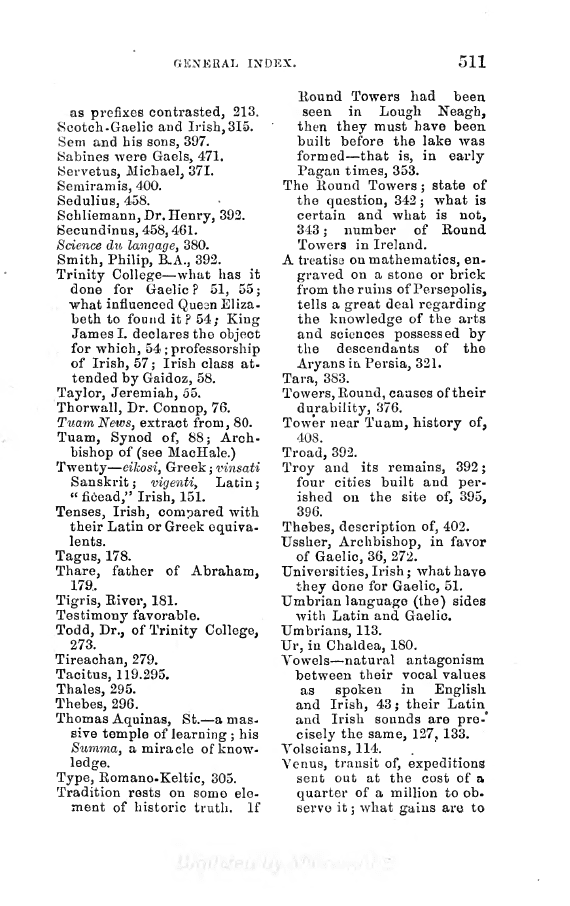
fiKNKRAL INDEX.
511
as
prefixes
contrasted,
213.
Scotch. Gaelic
and
Irish,
315.
Sem and his
sons,
397.
Sabines were
Gaels,
471.
tServetus,
Michael,
371.
Semiramis,
400.
Sedulius,
458.
Schliemann,
Dr.
Henry,
392.
Becundinus, 458,461.
Science
du
langage,
380.
Smith,
Philip,
B.A.,
392.
Trinity
College
what
has
it
done
for
Gaelic
?
51,
55
;
what
influenced
Quean
Eliza-
beth to found
it?
54;
King
James I.
declares the
object
for
which,
54
;
professorship
of
Irish, 57;
Irish
class
at-
tended
by
Gaidoz,
58.
Taylor,
Jeremiah,
55.
Thorwall,
Dr.
Connop,
76.
Tuam
News,
extract
from,
80.
Tuam,
Synod
of,
88;
Arch-
hishop
of
(see
MacHale.)
Twenty eikosi,
Greek
;
vinsati
Sanskrit;
vigenti,
Latin;
"
ficead," Irish,
151.
Tenses,
Irish,
compared
with
their
Latin or
Greek
equiva-
lents.
Tagus,
178.
Thare,
father
of
Abraham.
179,
Tigris, River,
181.
Testimony
favorable.
Todd,
Dr.,
of
Trinity
College,
273.
Tireachan,
279.
Tacitus,
119.295.
Thales,
295.
Thebes,
296.
Thomas
Aquinas,
St.
a
mas-
sive
temple
of
learning
;
his
Summa,
a
miracle of know-
ledge.
Type, Bomano.Keltic,
305.
Tradition
rests
on
some ele-
ment
of
historic
truth.
If
Round Towers
had
been,
seen
in
Lough
Neagh,
then
they
must
have
been
built before the
lake was
formed that
is,
in
eai'ly
Pagan
times,
353.
The Round
Towers;
state
of
the
question,
342
;
what
is
certain and what
is
not,
343
;
number of
Round
Towers
in
Ireland.
A treatise
on
mathematics,
en-
graved
on a
stouo or brick
from
the ruins
of
Persepolis,
tells
a
great
deal
regarding
the
knowledge
of the
arts
and sciences
possessed
by
the
descendants of
the
Aryans
m
Persia,
321.
Tara,
383.
Towers, Round,
causes of
their
durability,
376.
Tower near
Tuam,
history
of,
408.
Troad,
392.
^
Troy
and
its
remains,
392
;
four
cities
built
and
per-
ished on the
site
of,
395,
396.
Thebes,
description
of,
402.
Ussher,
Archbishop,
in
favor
of
Gaelic,
36,
272.
Universities,
Irish
;
what
have
they
done
for
Gaelic,
51.
Umbrian
language
(the)
sides
with Latin and
Gaelic.
Umbrians,
113.
Ur,
in
Chaldea,
180.
Vowels
natui'al
antagonism
between
their vocal values
as
spoken
in
English
and
Irish,
43
;
their
Latin
and
Irish sounds
are
pre-'
cisely
the
same,
127,
133.
Volscians,
114.
Venus,
transit
of, expeditions
sent
out at
the cost
of
a
quarter
of
a
million
to
ob-
serve
it
;
what
gains
are to
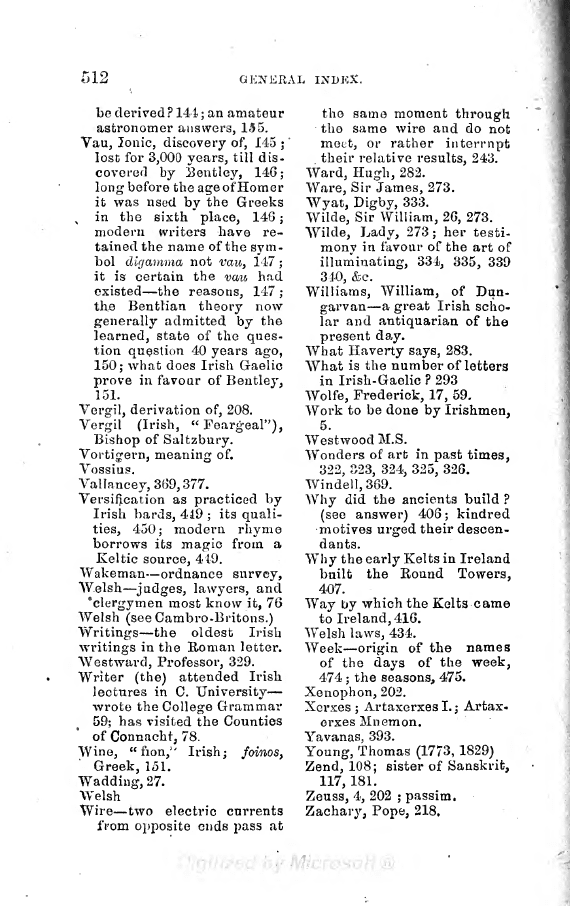
.12
GENERAL
INDEX.
be derived?
144;
an
amateur
astronomer
answers,
155.
Vau,
Ionic,
discovery
of,
145
;
lose
for
3,000
years,
till dis-
covered
by
Sentley,
146;
long
before
the
age
of
Homer
it
was used
bv
the
Greeks
x
in the
sixth
place,
146
;
modern writers
have
re-
tained the name
of
the
sym-
bol
digamma
not
vau,
147
;
it is
certain
the
vau
had
existed
the
reasons,
147
;
the
Bentlian
theory
now
generally
admitted
by
the
learned,
state
of
the
ques-
tion
question
40
years ago,
150;
what does Irish
Gaelic
prove
in
favour of
Beutley,
151.
Vergil,
derivation
of,
208.
Vergil
(Irish,
"
Feargeal"),
Bishop
of
Saltzbury.
Vortigern,
meaning
of.
Vossius.
Vallaneey,
369,377.
Versification as
practiced
by
Irish
bards,
449
;
its
quali-
ties,
450;
modern
rhyme
borrows
its
magic
from
a
Keltic
source,
419.
Wakeman
ordnance
survey,
"W.elsh
judges,
lawyers,
and
*clergymen
most
know
it,
76
Welsh
(seeCambro-Britons.)
Writing's
the
oldest
Irish
writings
in
the Roman letter.
"Westward,
Professor,
329.
Writer
(the)
attended
Irish,
lectures
in
C.
University
wrote
the
College
Grammar
59;
has
visited the
Counties
of
Counacht,
78.
Wine,
"fton," Irish;
foinos,
Greek,
151.
Wadding,
27.
Welsh
Wire
two
electric currents
from
opposite
ends
pass
at
the
same
moment
through
the
same
wire
and do
not
meet,
or
rather
interrupt
their relative
results,
243.
Ward,
Hugh,
282.
Ware,
Sir
James,
273.
Wyat, Digby,
333.
Wilde,
Sir
William,
26,
273.
Wilde,
Lady,
273;
her
testi-
mony
in
favour
of
the
art of
illuminating,
334,
335,
339
340,
&c.
Williams,
William,
of
Dun-
garvan
a
great
Irish
scho-
lar
and
antiquarian
of
the
present
day.
What
Haverty says,
283.
What
is
the
number of
letters
in
Irish-Gaelic
?
293
Wolfe,
Frederick,
17,
59.
Work
to be done
by
irishmen,
5.
Westwood
M.S.
Wonders
of
art in
past
times,
322,
323, 324,
325,
326.
Windell,369.
Why
did
the ancients
build
?
(see answer)
408;
kindred
motives
urged
their
descen-
dants.
Why
the
early
Kelts
in
Ireland
built
the Round
Towers,
407.
Way
by
which the
Kelts
came
to
Ireland,
416.
Welsh
laws,
434.
Week
origin
of
the
names
of the
days
of
the
week,
474
;
the
seasons,
475.
Xenophon,
202.
Xerxes
;
Artaxerxes
I.
;
Artax-
erxes Mnemon.
Yavanas,
393.
Young,
Thomas
(1773,
1829)
Zend, 108;
sister
of
Sanskrit,
117,
181.
Zeuss, 4,
202
;
passim,
Zachary, Pope,
218.
